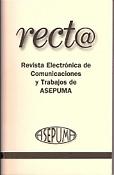Análisis multiobjetivo y modelos de regresión. Una aplicación para analizar el bienestar de los estudiantes españoles
DOI:
https://doi.org/10.24310/recta.22.2.2021.19880Keywords:
Programaci´on multiobjetivo intervalar, An´alisis econom´etrico, Bienestar de los estudiantes, Econom´ıa de la educaci´onAbstract
In this work, a novel approach is proposed in which econometric and multiobjective optimization techniques are combined with the aim of analysing socio-economic problems. This approach consists of two stages. Firstly, a regression model is carried out, from which, in the second stage, a multiobjective optimization problem is defined. An advantage of this combination is the possibility of introducing preferences of decision makers -desired values- for solving the problem. Particularly, we apply this approach to analyse the well-being of Spanish students through four indexes (positive feelings, motivation, sense of belonging, and bullying). In recent years, studying the students’ well-being has become very relevant because of its relation with their academic performance. Thus, four regressions are obtained (one per index) with respect to a set of explanatory variables, from which the multiobjective optimization problem is built. The results obtained using interval multi-objective programming provide us information both about how the improvement of one index can affect the values of the remaining ones, and also about the student’s profile who achieves an optimum balance among the well-being indexes.
Downloads
Publication Facts
Reviewer profiles N/A
Author statements
Indexed in
-
—
- Academic society
- N/A
- Publisher
- UMA Editorial. Universidad de Málaga
References
Allen, K., Kern, M. L., Vella-Brodrick, D., Hattie, J., y Waters, L. (2018). What schools need to know about fostering school belonging: a meta-analysis. Educational Psychology Review, 30:1-34.
https://doi.org/10.1007/s10648-016-9389-8
Athanasiou, K., Melegkovits, E., Andrie, E., Magoulas, C., Tzavara, C. K., Richardson, C., Greydanus, D., Tsolia, M., y Tsitsika, A. (2018). Cross-national aspects of cyberbullying victimization among 14-17-year-old adolescents across seven european countries. BMC Public Health, 18.
https://doi.org/10.1186/s12889-018-5682-4
Baker, D. P., Fabrega, R., Galindo, C., y Mishook, J. (2004). Instructional time and national achievement: Cross-national evidence. PROSPECTS, 34:311-334.
https://doi.org/10.1007/s11125-004-5310-1
Bitran, G. R. (1980). Linear multiple objective problems with interval coefficients. Management Science, 26(7):694-706.
https://doi.org/10.1287/mnsc.26.7.694
Chinneck, J. y Ramadan, K. (2000). Linear programming with interval coefficients. Journal of the Operational Research Society, 51.
https://doi.org/10.1057/palgrave.jors.2600891
Deb, K. y Miettinen, K. (2010). Nadir point estimation using evolutionary approaches: Better accuracy and computational speed through focused search. En Ehrgott, M., Naujoks, B., Stewart, T. J., y Wallenius, J., editores, Multiple Criteria Decision Making for Sustainable Energy and Transportation Systems, pp. 339-354, Berlin, Heidelberg. Springer Berlin Heidelberg.
https://doi.org/10.1007/978-3-642-04045-0_29
Demir, Y. y Kutlu, M. (2018). Relationships among internet addiction, academic motivation, academic procrastination and school attachment in adolescents. International Online Journal of Educational Sciences, (5):315-322.
https://doi.org/10.15345/iojes.2018.05.020
Ehrgott, M. y Tenfelde-Podehl, D. (2003). Computation of ideal and nadir values and implications for their use in mcdm methods. European Journal of Operational Research, 151(1):119-139.
https://doi.org/10.1016/S0377-2217(02)00595-7
Fan, W. y Williams, C. (2018). The mediating role of student motivation in the linking of perceived school climate and achievement in reading and mathematics. Frontiers in Education, 3:50.
https://doi.org/10.3389/feduc.2018.00050
Henriques, C., Luque, M., Marcenaro-Gutierrez, O., y Lopez-Agudo, L. (2019). A multiobjective interval programming model to explore the trade-offs among different aspects of job satisfaction under different scenarios. Socio-Economic Planning Sciences, 66:35-46.
https://doi.org/10.1016/j.seps.2018.07.004
Inuiguchi, M. y Kume, Y. (1991). Goal programming problems with interval coefficients and target intervals. European Journal of Operational Research, 52(3):345 - 360.
https://doi.org/10.1016/0377-2217(91)90169-V
Jogi, A.-L., Kikas, E., Lerkkanen, M.-K., y M¨agi, K. (2015). Cross-lagged relations between mathrelated interest, performance goals and skills in groups of children with different general abilities. Learning and Individual Differences, 39:105-113.
https://doi.org/10.1016/j.lindif.2015.03.018
Korhonen, T., Lavonen, J., Kukkonen, M., Sormunen, K., y Juuti, K. (2014). The Innovative School as an Environment for the Design of Educational Innovations, pp. 99-113. SensePublishers, Rotterdam.
https://doi.org/10.1007/978-94-6209-749-0_9
Miettinen, K. (1999). Nonlinear Multiobjective Optimization. Kluwer Academic Publishers, Boston.
Mischel, J. y Kitsantas, A. (2020). Middle school students' perceptions of school climate, bullying prevalence, and social support and coping. Social Psychology of Education, 23:51-72.
https://doi.org/10.1007/s11218-019-09522-5
OECD (2017). PISA 2015 Results (Volume III).
OECD (2019). PISA 2018 results in focus. OECD Publishing.
Oliveira, C. H. y Antunes, C. H. (2007). Multiple objective linear programming models with interval coefficients - an illustrated overview. European Journal of Operational Research, 181(3):1434- 1463.
https://doi.org/10.1016/j.ejor.2005.12.042
Parhiala, P., Torppa, M., Vasalampi, K., Eklund, K., Poikkeus, A.-M., y Aro, T. (2018). Profiles of school motivation and emotional well-being among adolescents: Associations with math and reading performance. Learning and Individual Differences, 61:196-204.
https://doi.org/10.1016/j.lindif.2017.12.003
Ryan, R. M. y Deci, E. L. (2018). Self-determination theory and the facilitation of intrinsic motivation, social development, and well-being. American Psychologist, 55(1):68-78.
https://doi.org/10.1037//0003-066X.55.1.68
Scheerens, J. y Hendriks, M. (2014). State of the Art of Time Effectiveness, pp. 7-29. Springer International Publishing, Cham.
https://doi.org/10.1007/978-3-319-00924-7_2
Strøm, I. F., Thoresen, S., Wentzel-Larsen, T., y Dyb, G. (2013). Violence, bullying and academic achievement: A study of 15-year-old adolescents and their school environment. Child Abuse & Neglect, 37(4):243-251.
https://doi.org/10.1016/j.chiabu.2012.10.010
Veenstra, R., Lindenberg, S., Oldehinkel, A. J., De Winter, A. F., Verhulst, F. C., y Ormel, J. (2005). Bullying and victimization in elementary schools: A comparison of bullies, victims, bully/victims, and uninvolved preadolescents. Developmental Psychology, 41(4):672-682.
https://doi.org/10.1037/0012-1649.41.4.672
Warr, P. (1999). Well-being and the Workplace, pp. 392-412. New York: Russell Sage Foundation.
Wierzbicki, A. P. (1980). The use of reference objectives in multiobjective optimization. En Fandel, G. y Gal, T., editores, Multiple Criteria Decision Making, Theory and Applications, pp. 468-486. Springer.
https://doi.org/10.1007/978-3-642-48782-8_32
Yu, J., McLellan, R., y Winter, L. (2020). Which boys and which girls are falling behind? Linking adolescents' gender role profiles to motivation, engagement, and achievement. Journal of Youth and Adolescence, 50:336-352.
https://doi.org/10.1007/s10964-020-01293-z
Yıldırım, S. (2012). Teacher support, motivation, learning strategy use, and achievement: A multilevel mediation model. The Journal of Experimental Education, 80(2):150-172.
Downloads
Published
How to Cite
Issue
Section
License

This work is licensed under a Creative Commons Attribution-NonCommercial 4.0 International License.









